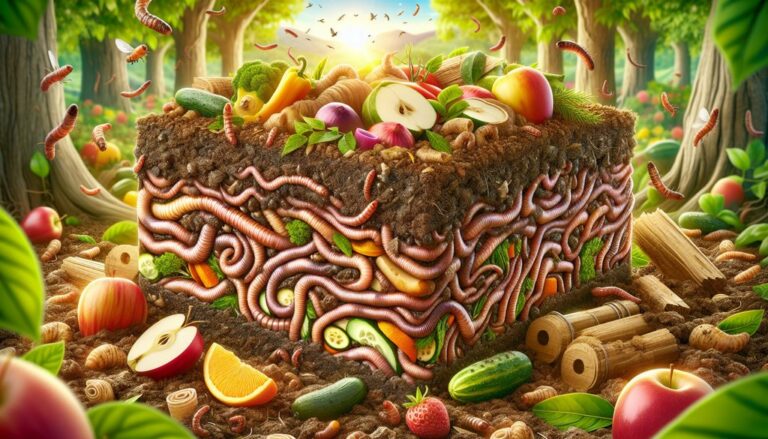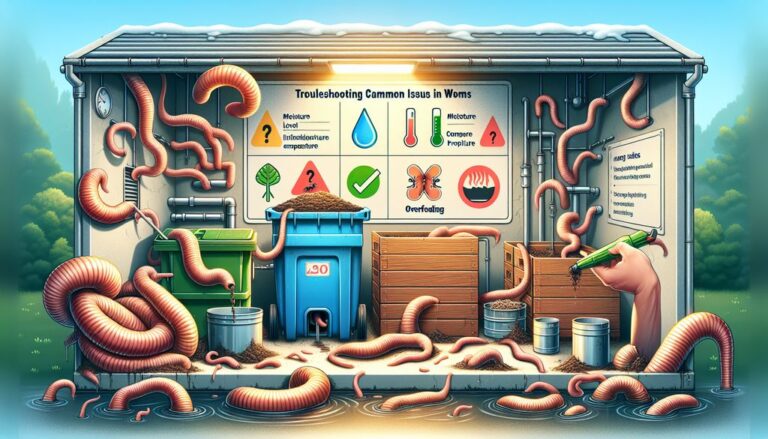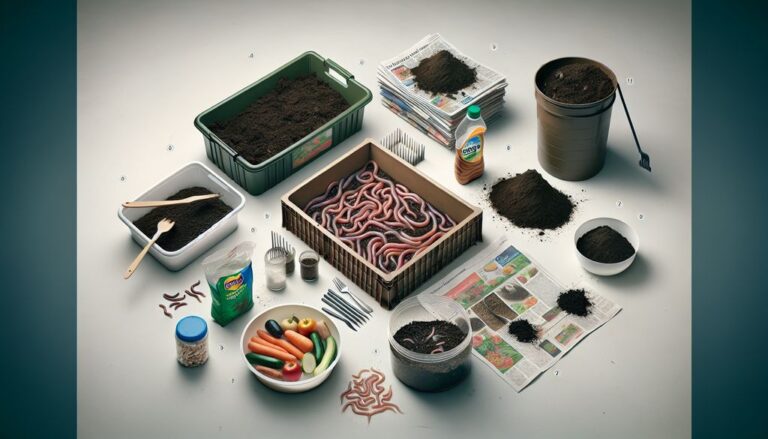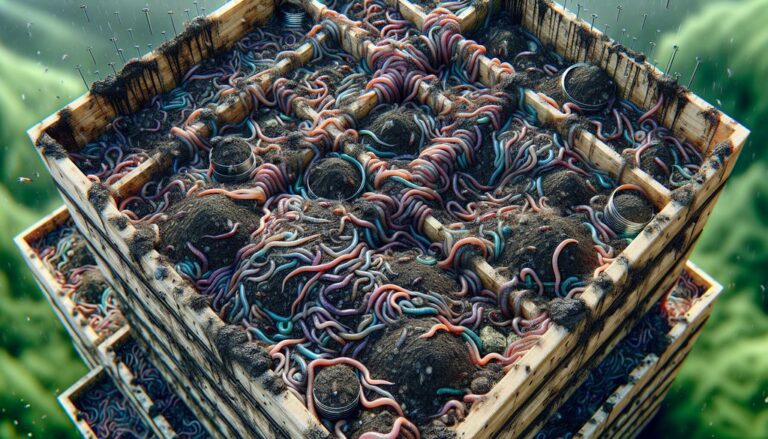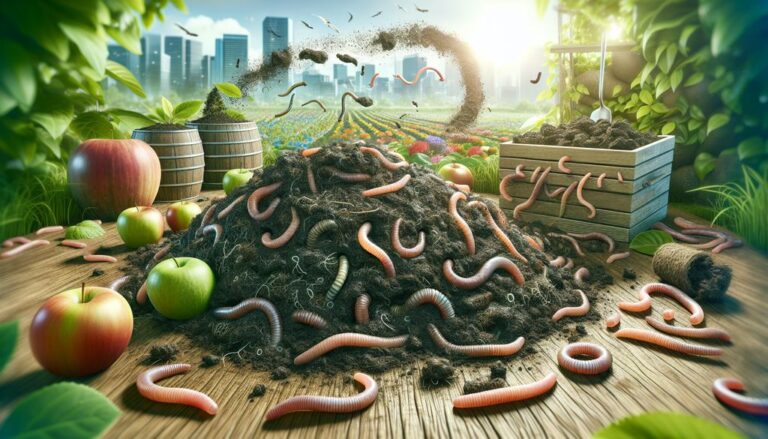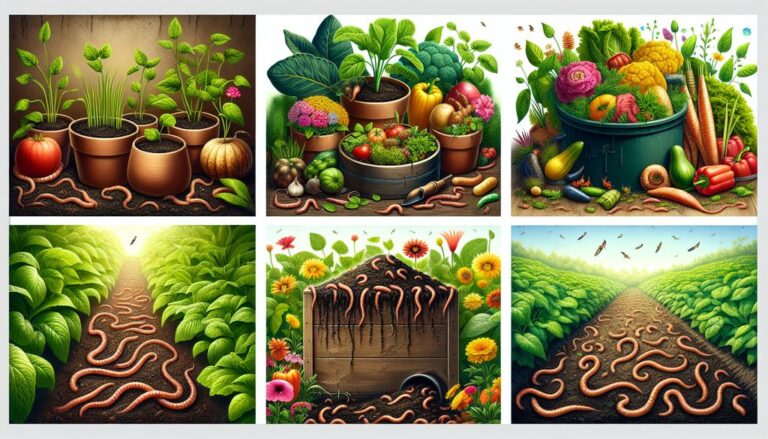In the world of gardening, worm castings are a hidden treasure for nurturing soil and promoting plant growth. These nutrient-rich organic matter, produced by earthworms, are often referred to as ‘Black Gold’ for their ability to enhance soil structure and provide essential nutrients for plants. In this article, we’ll explore the fundamentals of worm castings, their benefits, and practical applications for transforming your garden into a thriving oasis.
Key Takeaways
- Worm castings are like a gourmet meal for plants, packed with slow-releasing nutrients and beneficial microbes that boost growth.
- Adding worm castings into gardening practices can provide plants with a superfood that caters to their every need without the risk of overindulgence.
- Worm castings improve soil structure, promoting root health and water management—key to robust gardens.
- Brewing nutrient-rich worm tea from worm castings can boost plant growth and soil health.
- Using worm castings in your garden is one of the fastest ways to revive depleted soil.
Understanding Worm Castings
The Fundamentals of Worm Castings
Worm castings, often referred to as ‘Black Gold’ by gardeners, are the nutrient-rich end-product of earthworm digestion. These castings are a natural fertilizer that can transform the health of your garden soil and plants. They are packed with essential nutrients in a form that is readily accessible to plant roots, making them an ideal addition to any gardening regimen.
Worm castings are more than just waste; they are a complex mixture of organic material that has been broken down by earthworms into a potent soil amendment.
The benefits of using worm castings include improved soil structure, increased moisture retention, and a boost in plant health without the risk of chemical burn. Here’s a quick list of what worm castings provide:
- A concentration of nutrients like nitrogen, phosphorus, and potassium
- Beneficial microbes that aid in plant growth
- Enhanced soil aeration and drainage
- Natural pest repellent properties
By incorporating worm castings into your garden, you’re not only feeding your plants but also building a healthier ecosystem within your soil.
What Makes Worm Castings an Organic Superfood for Plants
Worm castings, often referred to as ‘Black Gold,’ are a testament to the wonders of nature’s recycling process. These castings are the byproduct of earthworms consuming and breaking down organic material. The result is a powerhouse of nutrients and beneficial microbes that are essential for plant growth.
Worm castings contain a wealth of minerals such as nitrogen, phosphorus, and potassium, which are vital for healthy plant development. Additionally, they are rich in humic acids, which aid in nutrient absorption, and enzymes that stimulate plant growth. Here’s a quick look at the nutrient composition:
- Nitrogen: Promotes leaf and stem growth
- Phosphorus: Crucial for root development and flowering
- Potassium: Enhances overall plant health and disease resistance
The beauty of worm castings lies in their ability to release nutrients slowly over time, ensuring that plants receive a steady supply without the risk of over-fertilization.
Moreover, the structure of worm castings allows for excellent soil aeration and moisture retention, creating an ideal environment for root systems to expand and thrive. By incorporating worm castings into your garden, you’re not just feeding your plants; you’re enhancing the very foundation of your garden’s ecosystem.
Enhancing Soil Structure with Nature’s Aerators
Worm castings are a boon for gardeners seeking to improve the soil structure of their gardens. These tiny, football-shaped particles work wonders by creating air pockets in the soil, which enhance air circulation and water flow. This is crucial for healthy root systems, as it prevents waterlogging and allows roots to breathe more easily.
By incorporating worm castings into your soil, you’re not just feeding your plants; you’re also transforming the soil into a more hospitable environment for plant growth.
The benefits of using worm castings for soil structure are numerous:
- They break up heavy clay soils, making them more workable.
- Sandy soils benefit by retaining more moisture.
- The overall tilth of the garden bed is improved, making it easier for roots to penetrate and access nutrients.
Worm castings release nutrients slowly, ensuring that plants receive a steady supply without the risk of nutrient burn. This gentle approach to fertilization is especially beneficial for sensitive plants. Whether you’re nurturing seedlings or maintaining mature plants, worm castings serve as a versatile soil amendment that supports strong and healthy plant development.
Benefits of Using Worm Castings
Worm Castings: A Superfood for Plants
Worm castings, often referred to as ‘Black Gold,’ are a testament to the wonders of nature’s recycling system. These castings are a powerhouse of nutrients, providing your plants with a balanced meal that’s both gentle and effective. Unlike synthetic fertilizers, worm castings release nutrients slowly, ensuring a steady supply that won’t overwhelm or damage delicate plant roots.
Worm castings are the end-product of earthworm digestion, transforming organic material into a rich, beneficial soil amendment.
The benefits of incorporating worm castings into your garden are manifold. Here’s a quick rundown:
- Nutrient-rich: They contain essential nutrients like nitrogen, phosphorus, and potassium.
- Microbe-packed: Beneficial microbes in the castings help plants absorb nutrients more efficiently.
- Soil structure: They improve soil aeration and water retention, fostering a healthy root environment.
By adding worm castings to your soil, you’re not just feeding your plants; you’re enhancing the entire ecosystem beneath them. It’s a simple step with profound effects, from boosting growth to improving resilience against pests and diseases. Embrace this organic superfood and watch your garden thrive.
Adding Worm Castings into Your Gardening Routine
Incorporating worm castings into your garden is like sprinkling fairy dust over your flower beds, but in this case, the magic is real and the workers are earthworms. Transform your garden by adding worm castings—a superfood for plants that can’t be overdone. This organic ‘black gold’ not only boosts growth from seedlings to harvest but also improves soil structure and fends off pests.
To get started, you don’t need a large amount. Just 10-20% of your total soil volume should be worm castings to achieve maximum benefits. This gentle organic fertilizer is so safe that there’s no risk of burning your plants, making it perfect for gardeners of all levels.
Worm castings are packed with slow-releasing nutrients and beneficial microbes that cater to the needs of plants without the risk of overindulgence.
Here’s a simple guide to help you incorporate worm castings into your routine:
- Mix into potting soil: When preparing your pots, blend in worm castings with your regular soil.
- Top-dress your garden beds: Sprinkle a layer of worm castings on top of the soil around your plants.
- Make worm tea: Brew a nutrient-rich liquid fertilizer by steeping worm castings in water.
- Enhance compost: Add worm castings to your compost pile to boost its nutrient content.
- Seed starting: Mix worm castings into the soil when planting seeds to give them a strong start.
Remember, worm castings are not just for vegetables and flowers; they can be used around all types of plants, offering improved drainage, increased water retention, and a robust garden brimming with life.
Practical Applications of Worm Castings
How to Use Worm Castings: 5 Easy Ways To Improve Your Soil
Incorporating worm castings into your garden is a straightforward and effective way to enhance soil health and plant vitality. Here are five easy methods to get started:
-
Mix into Potting Soil: For potted plants, blend worm castings with your potting soil. A good ratio is one part castings to three parts soil.
-
Top Dressing: Sprinkle a thin layer of castings on top of the soil around your plants. This can be done during the growing season to provide a slow-release nutrient boost.
-
Make Worm Tea: Brew a nutrient-rich ‘worm tea’ by steeping castings in water. This liquid fertilizer can be applied directly to plant foliage or soil.
-
Seed Starting: When planting seeds, add a handful of castings to the hole or mix them with the seed starting medium to encourage strong early growth.
-
Garden Beds: For garden beds, work the castings into the top few inches of soil. This will not only fertilize but also improve soil structure.
By regularly adding worm castings to your garden, you’re not only feeding your plants but also building a healthier, more resilient soil ecosystem. This natural approach ensures that your garden thrives while supporting sustainable practices.
Enhanced Seed Germination with Worm Castings
Worm castings are not just beneficial for mature plants; they are also incredibly effective in enhancing seed germination. By providing a nutrient-rich environment, worm castings encourage quicker and more robust seedling growth. This is because the castings contain essential minerals and a high concentration of beneficial microbes that support early plant development.
When you incorporate worm castings into your seed starting mix, you create a foundation for success. The castings’ structure allows for excellent aeration and moisture retention, which are critical for young plants.
To make the most of worm castings for seed germination, follow these simple steps:
- Mix worm castings with your seed starting soil at a ratio of 1:3.
- Plant your seeds as per the instructions for your chosen species.
- Water the mix gently to avoid washing away the castings.
- Keep the soil moist but not waterlogged as your seeds germinate.
- Once seedlings emerge, continue to care for them with a light application of worm casting tea every few weeks.
Remember, a little goes a long way with worm castings. They are a potent organic amendment that can significantly improve the health and vitality of your plants from the very beginning of their life cycle.
Conclusion
Worm castings, the soil’s unsung heroes, pack a punch for plant growth. They’re nutrient-dense and root-friendly. Add them to your garden beds; watch seedlings flourish with that extra vigor. Make worm tea; it’s liquid gold for leaves and roots alike. Vermicomposting at home? It’s simpler than you think. You’ll create organic fertilizers that feed plants and nurture soil life. Remember: good things grow from the ground up—start with superior soil. Let worm castings lead the way to lushness in your garden.
Frequently Asked Questions
What are the benefits of using worm castings?
Worm castings enrich soil with nutrients, improve structure for root growth, and boost plant health without the risk of chemical burn.
What exactly are worm castings?
Worm castings are a byproduct of earthworm digestion, serving as a natural fertilizer packed with essential nutrients for plants.
How do worm castings enhance soil structure?
Worm castings promote strong roots and foliage growth while improving moisture retention capacity, improving soil structure over time.
What makes worm castings an organic superfood for plants?
Worm castings are nutrient-dense and root-friendly, providing essential minerals to the soil and promoting robust plant growth.
How can I use worm castings to improve my soil?
You can use worm castings in 5 easy ways to transform your garden, revive depleted soil, and enhance seed germination.
Can worm castings be used in potted plants as well?
Yes, worm castings can be used in potted plants to provide slow-releasing nutrients and improve soil structure, benefiting plant growth over time.

